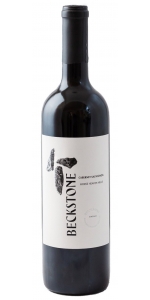Wine from Beckstone Wine
Over 13,000 years ago sudden ice dam ruptures at Glacial Lake Missoula led to a series of cataclysmic floods that swept across eastern Washington and down through the Columbia River Gorge. These ‘Missoula Floods’ were instrumental in the creation of loamy soils – a gritty mix of sand, silt, and clay deposits that offer a diversity ideal for viticulture. At Beckstone, we source the highest quality fruit from these rich, layered soils at the Wallula Vineyards overlooking the confluence of the Snake and Columbia Rivers. ‘Beck’ is an archaic noun that refers to a mountain river, especially a swiftly running stream with steep banks. Our Cabernet Sauvignon honors these historical floods and the ancient balance of sediments that is evident in the wine.
Beckstone Cabernet Sauvignon Horse Heaven Hills is made from 90% Cabernet Sauvignon, 7% Merlot, 2% Muscat Canelli and 1% Malbec.
Deep ruby in color with a nose of sweet fruits, the wine opens with notes of ripe strawberries and a delicate dusting of cocoa powder. Earthy spices begin to layer mid-palate, as well as notes of blueberries and a balanced minerality. The finish is soothing with a lingering sensation of dark caramel and toffee.
Over 13,000 years ago sudden ice dam ruptures at Glacial Lake Missoula led to a series of cataclysmic floods that swept across eastern Washington and down through the Columbia River Gorge. These ‘Missoula Floods’ were instrumental in the creation of loamy soils – a gritty mix of sand, silt, and clay deposits that offer a diversity ideal for viticulture. At Beckstone, we source the highest quality fruit from these rich, layered soils at the Wallula Vineyards overlooking the confluence of the Snake and Columbia Rivers. ‘Beck’ is an archaic noun that refers to a mountain river, especially a swiftly running stream with steep banks. Our Cabernet Sauvignon honors these historical floods and the ancient balance of sediments that is evident in the wine.
- back
Selected Options
Wineries
Categories
Pricing
Countries
Regions
Grape Types
Wineries
Organic/Free Shipping
Lismore Pinot Noir is made from 100 percent Pinot Noir
Complex bouquet of crushed rose petals, wild jasmine and fresh French herbs followed by a palate full of cranberry, raspberry and a long savory finish.
The grapes were picked at optimal ripeness. 30% whole bunch fermented in large 5000 liter vats with gentle pump-overs twice a day. The process allowed for a long extraction period which lends to the fruit expression and structure of this wine. The free run wine was drained off and the fermented grapes were then pressed in a traditional wooden basket press. The wine was racked into 225, 300 and 500 liter barrels where malolactic fermentation took place and the wine was aged for 10 months. 35% new French oak was used.
Review:
"The 2018 Pinot Noir comes from Walker Bay and Kaaimansgat and includes 30% whole-bunch fruit, aged for 11 months in 25% new oak. The bouquet sports vivid red cherry and raspberry fruit that is exceptionally well defined and beautifully integrated with the oak. The palate is medium-bodied with supple tannins, well-judged acidity and a slightly fleshy texture. There is just the right amount of salinity here, and the finish is kept on a tight leash, allowing the detail and precision to be fully expressed. A slight sour edge on the finish keeps you coming back for another sip. Excellent and reassuringly classy. - Neal Martin" - Antonio Galloni's Vinous (November 2019), 92 pts
"Walker Bay and Elandskloof are the twin sources of 30% whole bunch-fermented Pinot from Sam O'Keefe. Juicy, floral and charming, it's a graceful, fruit forward style with some clove and tobacco spice and refreshing acidity. The finish is a little firmer than I remember. 2020-24"- Tim Atkin (South Africa 2020 Special Report), 92 pts
Paradigm Cabernet Sauvignon is made from 89% Cabernet Sauvignon, 6% Merlot, 3% Petit Verdot, 2% Cabernet Franc.
20 months in French oak (only about a third of that is new oak) and for 20 more months in bottle before release
Our winemaking "style" is solely determined by this place or terrior we call "Paradigm." Winemaking is agriculture when you own your vineyards and are able to farm them to promote the very best Earth will give you. All of our selections of wines are made from five varietals on the estate. Every wine is 100% farmed and grown by us.
Complexity in our wines supported by luscious fruit and acidity is our hallmark. Our efforts during harvest and barrel cellaring concentrate on maintaining the freshness from the first day we handpicked each vineyard block. Simple winemaking protocols are employed while crucial “timing” oriented winemaking decisions rule each day.
Dark Cabernet color with beautiful aromas of black cherry, cassis, plus 5-spice, vanilla. Big, ripe and mouthcoating across the palate. The flavors are similar to the aromas with ripe fruit, berry/cherry pie, moderate tannins, and nice length. This wine shows enough structure to be age-worth, yet soft and balanced enough to enjoy upon release. Flavors linger in this tasty, dense wine. Tastes like Oakville. -Heidi Barrett





